

Autism's Gut-Brain Connection. Stress can send your stomach into a painful tailspin, causing cramps, spasms and grumbling.
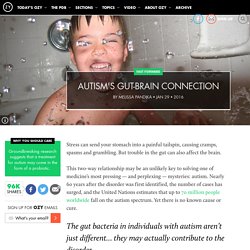
But trouble in the gut can also affect the brain. This two-way relationship may be an unlikely key to solving one of medicine’s most pressing — and perplexing — mysteries: autism. Nearly 60 years after the disorder was first identified, the number of cases has surged, and the United Nations estimates that up to 70 million people worldwide fall on the autism spectrum.
Yet there is no known cause or cure. The gut bacteria in individuals with autism aren’t just different… they may actually contribute to the disorder. But scientists have found promising clues in the gut. Today autism is treated primarily through behavioral therapy. Autism is a complex spectrum of disorders that share three classic features — impaired communication, poor social engagement and repetitive behaviors. Treatment for autism may one day come in the form of a probiotic — live, ’friendly’ bacteria like those found in yogurt. Brain inflammation a hallmark of autism, Johns Hopkins analysis shows. Related Articles Chemical derived from broccoli sprouts linked to improved social interaction, verbal communication Autism experts join forces in new center at School of Public Health / Gazette While many different combinations of genetic traits can cause autism, brains affected by autism share a pattern of ramped-up immune responses and related inflammation, an analysis of data from autopsied human brains reveals.
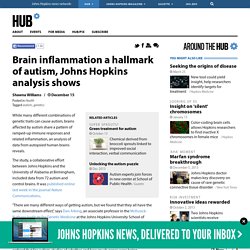
The study, a collaborative effort between Johns Hopkins and the University of Alabama at Birmingham, included data from 72 autism and control brains. It was published online last week in the journal Nature Communications. "There are many different ways of getting autism, but we found that they all have the same downstream effect," says Dan Arking, an associate professor in the McKusick-Nathans Institute for Genetic Medicine at the Johns Hopkins University School of Medicine. Other authors on the study are Simone Gupta, Shannon E. 10 Calming Toys for Children with Autism. Looking for a toy for a child with autism?
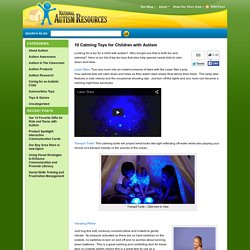
Why not get one that is both fun and calming? Here is our list of top ten toys that also help special needs kids to calm down and relax. Laser Stars: Turn any room into an instant universe of stars with the Laser Star Lamp. Your special kids will calm down and relax as they watch stars slowly float above their head. This lamp also features a crab nebula and the occasional shooting star. Tranquil Turtle: This calming turtle will project what looks like light reflecting off water while also playing your choice of a tranquil melody or the sounds of the ocean. Tranquil Turtle – Click here to View Click here to View Vibrating Pillow: Just hug this soft, corduroy covered pillow and it starts to gently vibrate. Vibrating Animal Massagers: These cute animal themed massagers provide instant ahhhh!
Rain Tube: Turn over the soothing rain tube and watch as grey pellets roll through a cascade of clear discs making the sound of soothing rain. Weighted Blanket: Asperger's and coming across rude. Question My son with Asperger’s comes across as rude – how can I help him change?
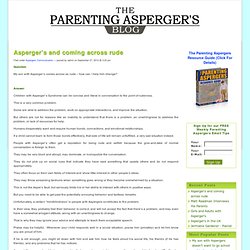
Answer Children with Asperger’s Syndrome can be concise and literal in conversation to the point of rudeness. This is a very common problem. Some are able to address the problem, work on appropriate interactions, and improve the situation. But others are not for reasons like an inability to understand that there is a problem, an unwillingness to address the problem, or lack of resources for help. Humans desperately want and require human bonds, connections, and emotional relationships. Drug reverses autism brain activity in mice, study shows. A generic blood pressure drug could prevent hyperactive brain cell firing associated with early stages of autism spectrum disorder, according to a new study.

Injecting pregnant mice with Bumetanide, a diuretic, appears to correct a developmental switch flipped during childbirth that reverses the firing characteristics of neurons in newborns, according to a study published online Thursday in the journal Science. Bumetanide mimics the effects of oxytocin, a hormone released during labor that helps protect newborns from the stresses and complications of birth, the study found. That’s not autism: It’s simply a brainy, introverted boy. I have followed William in my therapy practice for close to a decade.
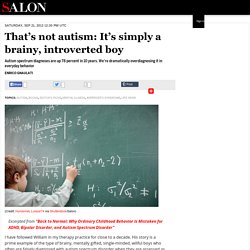
His story is a prime example of the type of brainy, mentally gifted, single-minded, willful boys who often are falsely diagnosed with autism spectrum disorder when they are assessed as young children. This unfortunate occurrence is partly due to defining autism as a “spectrum disorder,” incorporating mild and severe cases of problematic social communication and interaction, as well as restricted interests and behavior. Jacqueline, William’s mother, realized that he was a quirky baby within weeks of his birth. When she held him in her arms, he seemed more fascinated by objects in his field of vision than by faces. The whir and motion of a fan, the tick-tock of a clock, or the drip-drip of a coffeemaker grabbed William’s attention even more than smiling faces, melodic voices, or welcoming eyes.
Some normal developmental milestones did not apply to William. At preschool, William was a veritable pied piper. Dr.